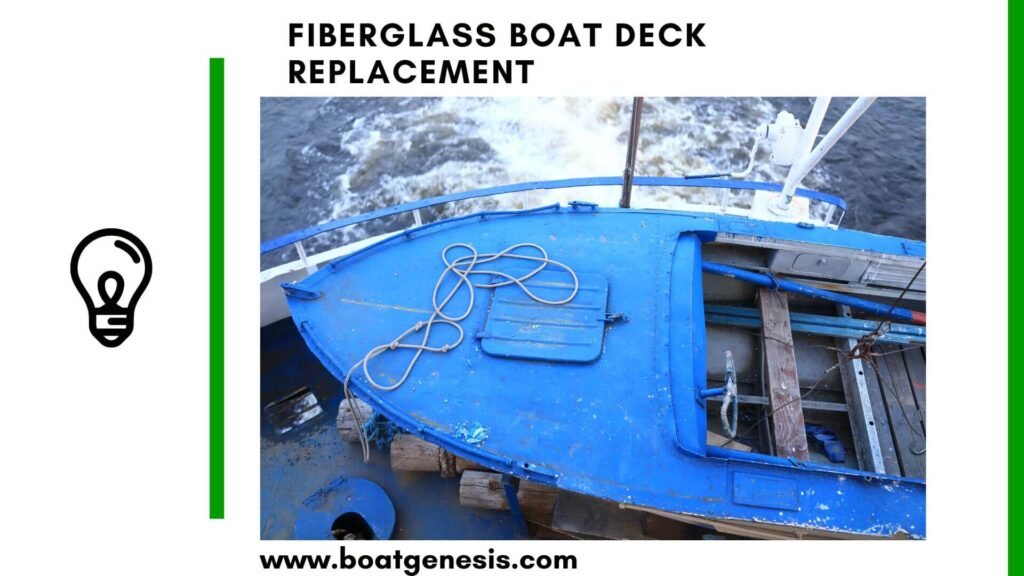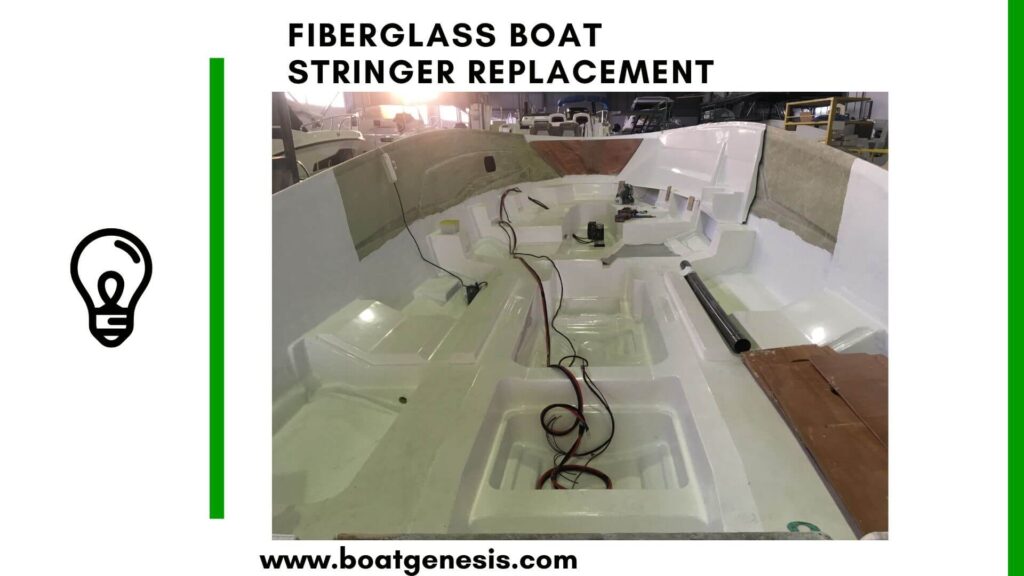Marine epoxy adhesives are essential for fiberglass repairs, especially for boats and other watercraft. These adhesives bond fiberglass materials together effectively, ensuring a strong and durable fix. They can handle harsh marine environments, offering resistance to water, chemicals, and UV light.
Choosing the right epoxy can make a significant difference in the longevity and effectiveness of your repairs.
When selecting a marine epoxy adhesive, you should pay attention to factors like curing time, strength, and ease of use.
Curing time can vary widely, which is crucial for projects that need to be completed quickly.
Strength ratings help determine how well the adhesive will hold up under pressure, while user-friendly options can make application simpler and faster.
We will explore the best marine epoxy adhesives for fiberglass repairs to help you make an informed decision on the right choice for your next project.
- Best Marine Epoxy Adhesives for Fiberglass Repairs
- Buying Guide
- Frequently Asked Questions
- What are the most effective waterproof epoxies for repairing boats?
- How does marine-grade epoxy compare to standard adhesives for fiberglass repair?
- Can fiberglass be repaired with any type of epoxy?
- What characteristics should I look for in a high-quality marine epoxy?
- How do I prepare a fiberglass surface for epoxy application?
- Are there any marine epoxies that can be used underwater for emergency repairs?
Best Marine Epoxy Adhesives for Fiberglass Repairs
We have gathered a list of the best marine epoxy adhesives perfect for fiberglass repairs. These products will help ensure strong bonds and long-lasting results for your projects.
Whether you are fixing a boat or another fiberglass surface, our selection provides reliable options to get the job done.
1. J-B Weld MarineWeld
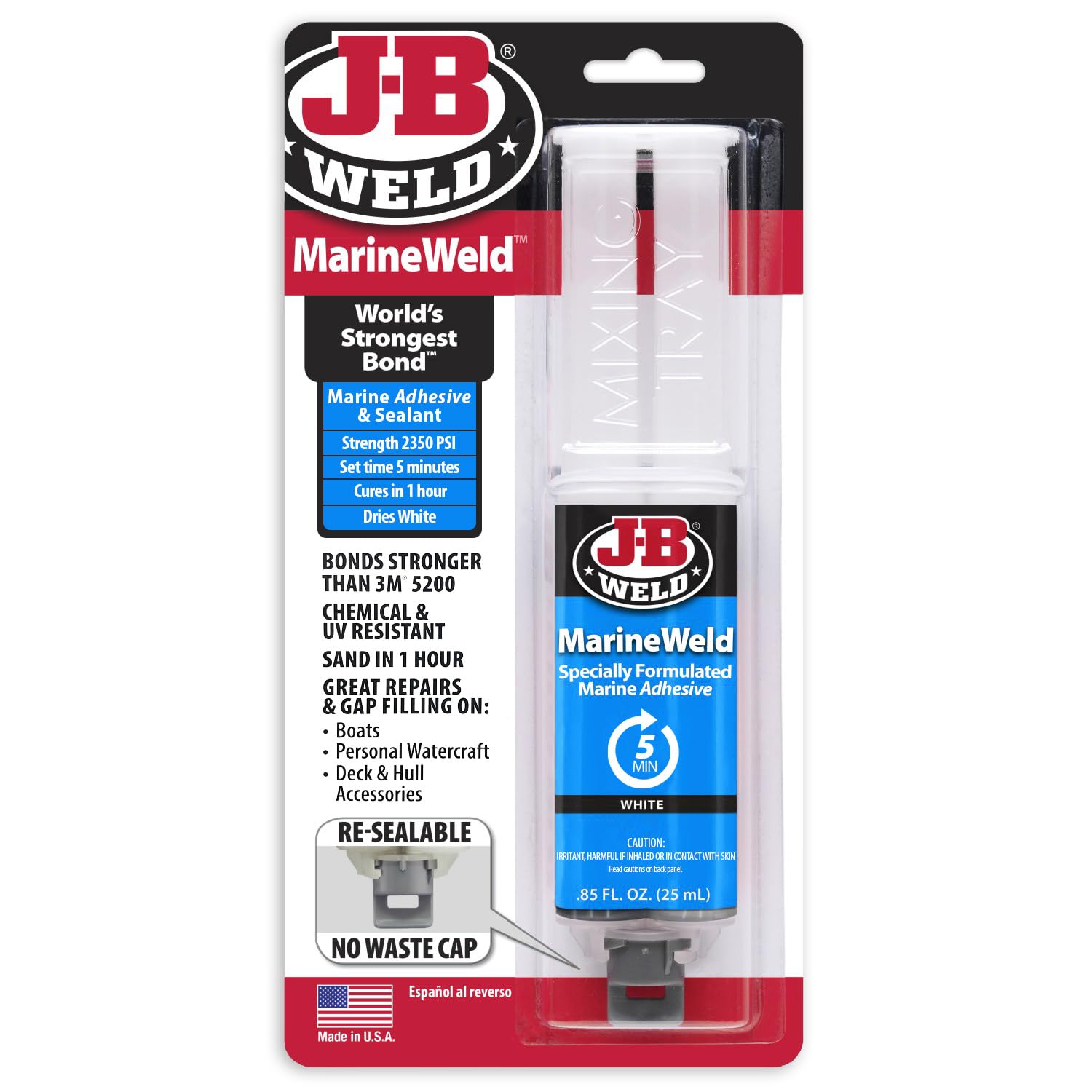
We suggest considering J-B Weld MarineWeld for strong and durable fiberglass repairs.
Pros
- Provides a strong, flexible bond
- Waterproof and resistant to chemicals and UV light
- Easy-to-use syringe for mixing
Cons
- Curing time may be longer than expected
- Can be too thin for certain applications
This two-part adhesive from J-B Weld is designed specifically for marine and fiberglass repairs. It offers a waterproof bond that can handle exposure to chemicals and UV light.
The included syringe makes mixing simple, which is a bonus for users who appreciate convenience.
While many praise its bond strength, there are mixed opinions on the curing time. Some users found that it took longer to set than anticipated.
Additionally, there are comments about its thickness, with a few people wishing it had a more gel-like consistency.
Overall, J-B Weld MarineWeld stands out for its ease of use and effectiveness in repairing various marine surfaces. It can be a reliable choice for those tackling fiberglass projects.
2. Loctite Marine Epoxy

This epoxy is a reliable choice for anyone needing strong underwater repairs.
Pros
- Can bond wet surfaces, making it ideal for underwater repairs.
- Fast-setting formula that cures in just 24 hours.
- Works with various materials, from fiberglass to metal.
Cons
- Visible after application, which might bother some users.
- Application can be messy if not kept tidy.
Loctite Marine Epoxy stands out because it can be used underwater. This feature saves time and hassle, especially for repairs in boats or pools.
The dual-syringe applicator allows for easy mixing and application, which is a great convenience.
The epoxy sets in just 2 hours, making it quick for those urgent fixes.
Once fully cured, it creates a tough bond that resists water and impacts. It’s versatile and sticks to many surfaces, including glass and concrete.
On the downside, some users mention that it’s not a perfect match in color after drying. The finish might not be as pristine as expected.
Also, while it is effective, the application process can require a bit of cleanup.
3. PC-Products PC-11 Epoxy Adhesive Paste

This marine-grade epoxy is a solid choice for various bonding tasks, especially for those needing effective repairs in wet or challenging conditions.
Pros
- Handles both dry and wet bonding needs.
- Suitable for a variety of materials, including fiberglass and metal.
- Easy to apply, even for overhead projects, due to its high tack.
Cons
- Takes time to fully cure, which may slow down projects.
- Some users noted stickiness as a downside.
- Requires specific temperatures for optimal mixing and application.
PC-11 stands out for its ability to bond in underwater situations. This makes it an excellent option for marine repairs.
We appreciate that it offers extended working time, allowing us to make adjustments as needed.
The product’s high tack and paste-like consistency make it easy to use in vertical or overhead applications. This feature is particularly helpful for those tricky repairs where gravity might otherwise be a challenge.
While it does take a while to cure fully, the result is a strong bond that can handle a range of conditions.
It shows good resistance to various chemicals, making it reliable for multiple applications around the home or on a boat.
Overall, PC-Products PC-11 is a versatile adhesive that meets various repair needs effectively. Its strengths in bonding and application make it a worthy addition to our toolkit for fiberglass repairs.
4. TotalBoat 5:1 Marine Epoxy Resin Kit

TotalBoat’s epoxy resin offers strong, versatile bonding for various marine and woodworking projects.
Pros
- High durability in tough environments
- Easy to use with color-coded pumps
- Compatible with many materials and fillers
Cons
- Longer setup time than some might prefer
- Some users report issues with leaking
- Temperature can affect curing speed
TotalBoat 5:1 Marine Epoxy is designed for serious repairs and builds. Its powerful bond works well with fiberglass, wood, and various composites, making it suitable for boats, kayaks, and more.
This marine-grade adhesive stands strong in tough conditions, ensuring lasting repairs.
The epoxy comes with easy-to-use pumps for precise mixing. This feature helps achieve the correct ratio for the best results.
We appreciate the flexibility that allows this epoxy to be used for different applications, from boat building to automotive repairs.
It’s also noteworthy that this epoxy can be combined with fillers to create strong compounds. With this, users can easily address gaps and imperfections.
The cured epoxy is sandable and paintable, allowing for a polished finish on any project.
For anyone looking to tackle fiberglass repairs or enhance woodworking projects, this product is worth considering. The price point is reasonable given its quality and versatility.
5. J-B Weld Fiberglass Resin
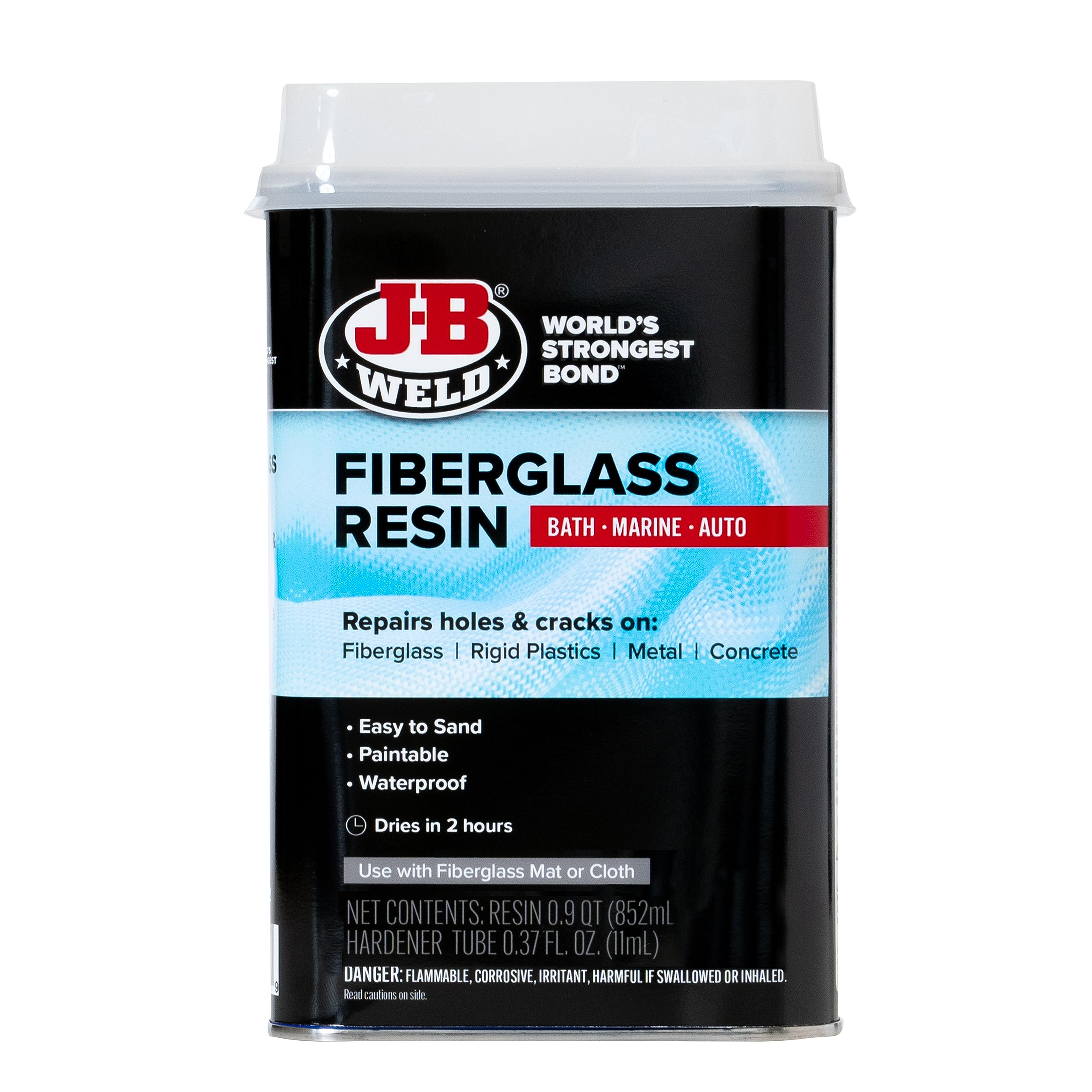
This product is a reliable choice for those seeking strong, waterproof repairs on fiberglass surfaces.
Pros
- It offers quick curing within two hours.
- Works well with fiberglass cloth for added strength.
- Suitable for various surfaces including metal and concrete.
Cons
- It may require careful application for best results.
- Not ideal for very large repairs without reinforcement.
J-B Weld Fiberglass Resin is a two-component system designed for tough repairs. It fills gaps, seals holes, and fixes cracks.
This versatile resin can be used on boats, pools, and even tubs. When reinforced with fiberglass cloth, it becomes even stronger.
The product dries in about two hours, which can be a big plus if we are in a hurry.
Its waterproof nature allows for use in areas exposed to water without worry. Many find that it adheres well to different materials, making it useful for various repair projects.
While some may think the price is on the higher side, the quality often justifies it. Users frequently mention their trust in J-B Weld, having seen positive results from this brand.
Overall, this resin promises to deliver strong, lasting repairs, making it a solid option for our adhesive needs.
6. J-B Weld MarineWeld

This epoxy adhesive is a solid choice for various fiberglass repairs, offering strong bonding capabilities.
Pros
- Forms a durable bond on multiple surfaces, including fiberglass and metal.
- Quick setting time of 4-6 hours makes it easy to use.
- Fully cured product can withstand harsh conditions and is waterproof.
Cons
- Takes a while to fully cure (15-24 hours) before being used.
- Requires proper surface preparation for the best results.
- Strong odor during application may be off-putting.
We find J-B Weld MarineWeld to be a practical solution for anyone tackling marine repairs.
Its two-part formula creates a strong, lasting bond that works well for a variety of materials such as fiberglass, metal, and plastic.
With a set time of just 4 to 6 hours, users can expect quicker results than many similar products.
Once fully cured, this epoxy can be sanded, shaped, or drilled, adding to its versatility.
Preparation is key when using this adhesive.
Cleaning the surfaces before applying MarineWeld ensures a better bond.
The mixing ratio of 1:1 is straightforward, making it accessible even for those new to DIY projects.
7. Mallbaola Marine Fiberglass Repair Kit
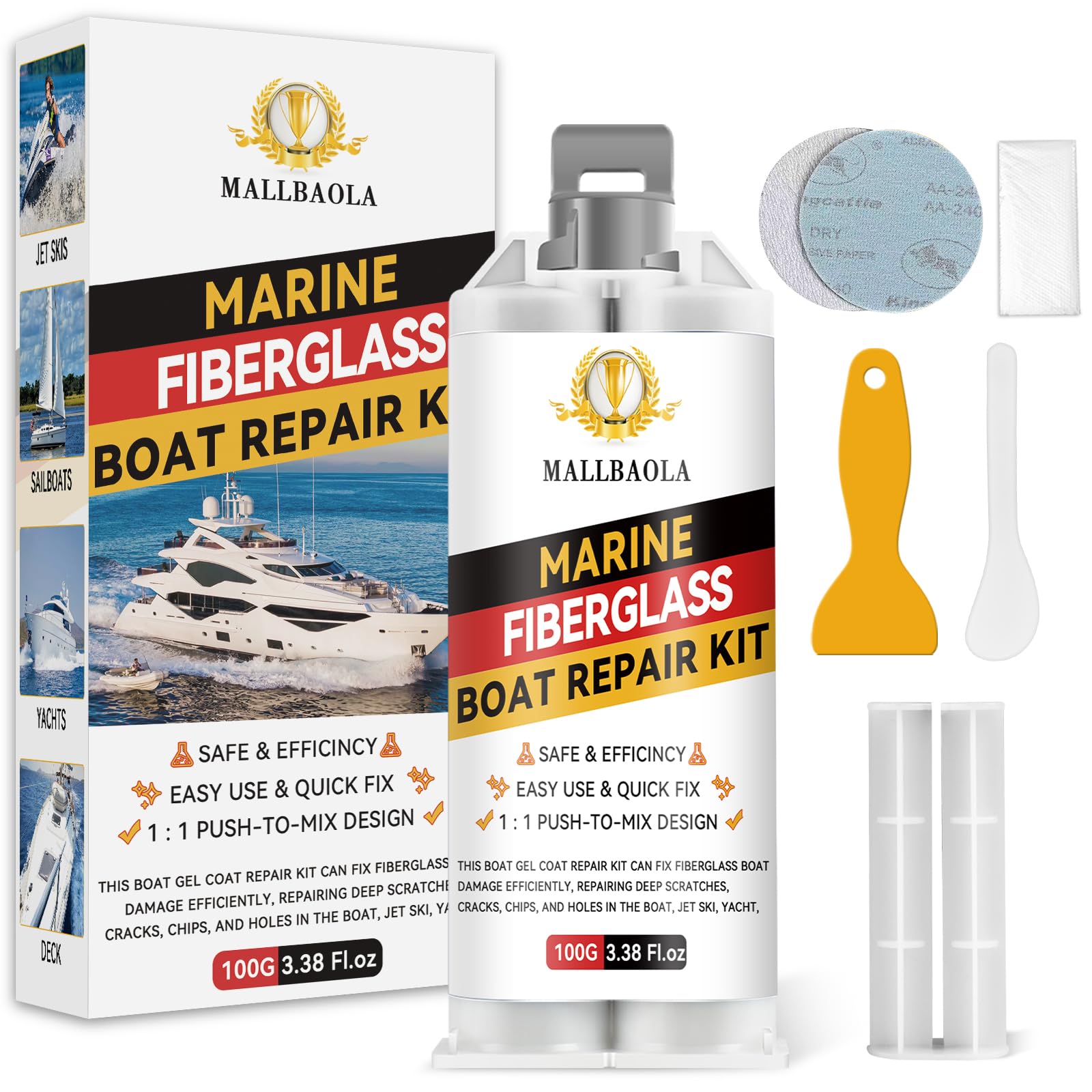
This repair kit is a solid choice for fixing damage on fiberglass and other surfaces.
Pros
- Simple to use, even for beginners.
- Offers strong bonding that lasts.
- Can repair various types of surfaces.
Cons
- May require multiple applications for larger holes.
- Sanding can be tricky if too much product is applied.
- Only intended for areas above the waterline.
We found that the Mallbaola Marine Fiberglass Repair Kit is an effective solution for various repairs on boats and other watercraft.
It repairs deep cracks, chips, and holes, restoring the finish of your vessel easily.
The kit is user-friendly, making it an appealing option for those who may not have prior experience with repairs.
It includes all the necessary tools, such as sandpaper and a scraper. This gives us confidence that we can achieve a seamless repair.
Its strong adhesion means that once it’s applied, we can expect durability against tough marine conditions. However, larger damage may need more than one application, which is something to keep in mind.
Proper application and sanding ensure a smooth finish, but care is needed to avoid applying too much product.
Buying Guide
When choosing the best marine epoxy adhesive for fiberglass repairs, we consider several factors to ensure we make the right choice.
Key Features to Look For
| Feature | Importance |
|---|---|
| Strength | Epoxy should provide strong bonds. |
| Set Time | Faster set times can save us time. |
| Water Resistance | Vital for marine environments. |
| Ease of Use | A user-friendly application helps us. |
Things to Consider
Application Method
Some epoxies come in tubes, while others require mixing. We should choose one that fits our skill level.Temperature Range
Epoxy should work well in the temperatures we expect in our working environment.Repair Size
We need to think about how much area we’ll be repairing. Some products are better for small fixes, while others suit larger jobs.Curing Time
Make sure we know how long it takes to fully cure. Some projects require faster results than others.Shelf Life
Check how long the epoxy lasts before it needs to be used. Expired products may not perform as expected.
Frequently Asked Questions
We often receive questions about marine epoxy adhesives and their use in fiberglass repairs. Here are some key points to help clarify common queries regarding waterproof epoxies, their characteristics, and application methods.
What are the most effective waterproof epoxies for repairing boats?
For boat repairs, we recommend epoxies with high water resistance and durability.
Some popular choices include West System Epoxy and 3M Marine Adhesive Sealant. These products provide strong bonds and withstand harsh marine conditions.
How does marine-grade epoxy compare to standard adhesives for fiberglass repair?
Marine-grade epoxy is specifically designed for wet environments and harsh conditions.
Unlike standard adhesives, it offers better adhesion, flexibility, and resistance to water and chemicals. This makes it ideal for fiberglass repairs on boats.
Can fiberglass be repaired with any type of epoxy?
Not all epoxies are suitable for fiberglass repairs.
We should use marine-grade or specialized epoxies that bond well with fiberglass materials. These options ensure long-lasting and effective repairs.
What characteristics should I look for in a high-quality marine epoxy?
When choosing a marine epoxy, we should consider properties like water resistance, cure time, and tensile strength.
A good marine epoxy should also have a clear finish and be easy to sand for a smooth surface after curing.
How do I prepare a fiberglass surface for epoxy application?
To prepare the fiberglass surface, we need to clean it thoroughly to remove dirt and grease.
Sanding the area lightly can also help the epoxy bond better. It’s essential to follow the manufacturer’s instructions for the best results.
Are there any marine epoxies that can be used underwater for emergency repairs?
Yes, there are marine epoxies designed for underwater applications. Products like J-B Weld WaterWeld or 3M Marine Adhesive Sealant can be used for emergency repairs. These epoxies cure even when submerged, making them useful in urgent situations.

Warren is the founder of BoatGenesis and brings practical experience in fiberglass boat repair, marine equipment testing, and powerboat building. He has worked on a range of repair and restoration projects and now focuses on creating clear, research-based guides to help boat owners avoid costly mistakes and make smarter maintenance decisions. Learn more about Warren.


